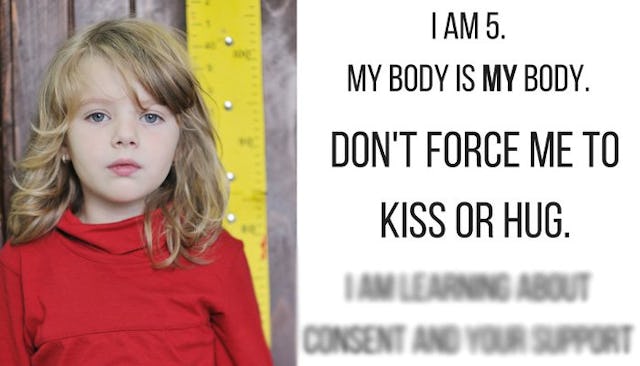Viral Meme Spreads Important Message About Kids And Consent

We need to give kids a choice when it comes to hugging and kissing family members
Teaching children about consent is crucial, so why do some parents still insist their kids hug and kiss relatives even if they don’t want to? As consent and bodily autonomy become a bigger conversation, there are those speaking out about how we need to give children agency over their own bodies — even if it means turning down hugs from grandma and grandpa.
A Mighty Girl shared a meme from Safe Kids, Thriving Families about not forcing kids to hug or kiss family and friends. Telling a child they must obey another person’s demand for physical affection sends a damaging message about consent and ownership of their bodies.
A CNN piece by Katia Hetter gives parents tips for helping children learn that they don’t have to accept touching from anyone out of a feeling of obligation or fear of being viewed as impolite. She explains the directive she gave her own daughter telling her, “I would like you to hug Grandma, but I won’t make you do it.”
Hetter says, “She doesn’t have to hug or kiss anyone just because I say so, not even me. I will not override my own child’s currently strong instincts to back off from touching someone who she chooses not to touch. I figure her body is actually hers, not mine.”
This seems so obvious, doesn’t it? But how many of us grew up with our parents insisting we accept hugs and kisses from grandmas, grandpas, aunts and uncles with zero regard for our feelings on the subject? I remember being anxious at big family events as a kid knowing how many of our distant relatives would expect to touch me. I recall being nervous of how they smelled or how their beard stubble felt — and the persistent feeling that I simply didn’t want to be touched.
That’s why it’s so crucial that we recognize the validity of those instincts in even the youngest kids. They may not be able to articulate the reason for their discomfort with physical affection, but we need to honor it in order to make good on our lessons of consent. How can we tell our kids that their bodies are their own and then remove that very agency because Aunt Betty wants to give them a kiss? The lesson needs to be that it’s up to them every time — no exceptions.
Hetter acknowledges that by giving her child freedom to decide who touches her and when doesn’t mean she gets to be rude or disrespectful. “She has to be polite when greeting people, whether she knows them or not. When family and friends greet us, I give her the option of ‘a hug or a high-five.’ Since she’s been watching adults greet each other with a handshake, she sometimes offers that option.”
I wish my parents felt that way as I still have unpleasant memories of unwanted hugs and kisses from relatives I hardly knew and while I don’t think it caused me to give in to things sexually as an adult, I do know how it felt as a child. It hurt to know that my say didn’t mean anything and that pleasing someone else ranked higher than my gut feeling of, “no, don’t touch me.” To that end, I’ve always followed Hetter’s policy with my own kids. If they don’t want a hug or kiss from grandma, we never force it. It just feels right.
For so many reasons, it’s important that we respect a child’s wishes when it comes to who touches them. If we want them to make healthy choices as they get older in regard to sex, we need to show them now that they needn’t please anyone with their bodies; no matter how innocent and loving the request. Hetter says, “Would you want your daughter to have sex with her boyfriend simply to make him happy? Parents who justify ordering their children to kiss grandma may say, ‘It’s different.'”
As the author notes, it really isn’t. We’re giving them the tools now to make healthy decisions about their bodies and in their relationships down the road. These are habits that, as the meme suggests, will keep children safer for the rest of their lives. It’s a great lesson to teach, no matter your parenting style.
This article was originally published on